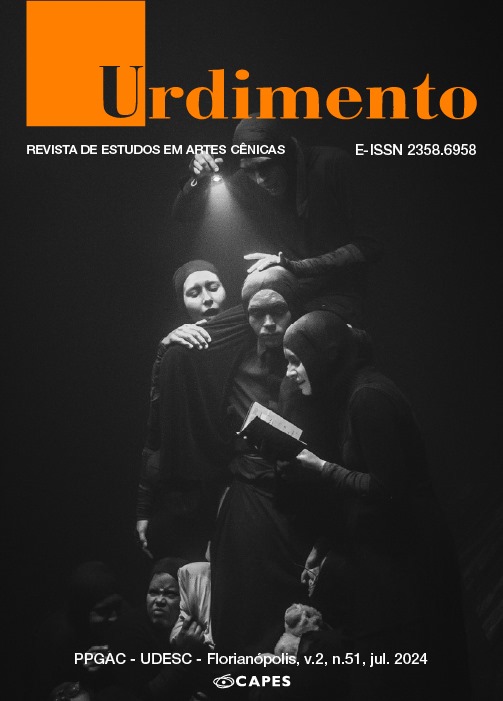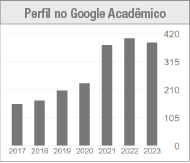Together we are stronger: Sophocles' treatise "On the Chorus"
DOI:
https://doi.org/10.5965/1414573102512024e0114Keywords:
coralities, Sophocles, dramaturgyAbstract
This paper proposes a detailed study of the implications of a treatise on choirs attributed to Sophocles. In this lost work, the focus was on choral activity, understood through the confrontation between tradition and its renewal. Based on the indirect references to Sophocles' career and dramaturgy found in authors and works from antiquity, the aim was to make understandable the performative contexts that best clarify Sophocles' possible ideas and arguments.
Downloads
References
BAGORDO, Andreas. Die antiken Traktate über das Drama: Mit einer Sammlung der Fragmente. Stuttgart & Leipzig: Teubner, 1998.
BAGORDO, Andreas. Lyric Genre Interactions in the Choruses of Attic Tragedy, in SKENÈ – Journal of Drama and Theatre Studies 1.1, p. 37–55 , 2015.
BAUER, Detlev. Der Chor im Theater des 20. Jahrhunderts: Typologie des theatralen Mittels Chor. Tübingen: De Gruyter, 2019.
BOWRA, Maurice. Sophocles on His Own Development. The American Journal of Philology, 61. 4 , p. 385-401, 1940.
CSAPO, Eric & SLATER, William. The context of ancient drama. Ann Arbor: The University of Michigan Press, 2001.
D’ANGOUR, Armand. “Old” and “New” Music: The Ideology of Mousikē. In: Tosca Lynch & Eleonora Rocconi (orgs.). A companion to ancient Greek and Roman music. Hoboken: Wiley, p. 409-420, 2020.
D’ANGOUR, Armand. The Greeks and the New: Novelty in Ancient Greek Imagination and Experience. Cambridge: Cambridge University Press, 2011.
De MARTINO, Francesco “Sofocle ‘stravagante,’” in Alan Sommerstein (org.). Shards from Kolonos: Studies in Sophoclean Fragments. Bari: Levante Editori, p. 435-464, 2003.
DUPONT, Florence. Aristóteles ou o vampiro do teatro ocidental. Desterro [Florianópolis]: Cultura e barbárie, 2017.
ELSE, Gerald. Aristotle's Poetics: The Argument. Cambridge: Harvard University Press, 1957.
ELSE, Gerald. The Origin and Early Form of Greek Tragedy. Cambridge: Harvard University Press,1965.
GARVIE, Alex. Aeschylus’ Supplices. Play and Trilogy. Cambridge: Cambridge University Press,1969.
GRIFFITH, Mark. Between Local and Global: Music and Cultural Identity in Ancient Greece. In: Tosca Lynch & Eleonora Rocconi (orgs.). A companion to ancient Greek and Roman music. Hoboken: Wiley, p. 381-396, 2020.
HERINGTON, John. Poetry into Drama. Early Tragedy and the Greek Poetic Tradition. Berkeley, Los Angeles e Londres: University of California Press, 1985.
JACKSON, Lucy. The Chorus of Drama in the Fourth Century BCE. Presence and Representation. Oxford: Oxford University Press,2020.
HANINK, Johana. Lycurgan Athens and the Making of Classical Tragedy. Cambridge classical studies. Cambridge/ New York: Cambridge University Press, 2014.
KAIMIO, Maarit. The Chorus of Greek Drama with the Light of the Person and Number Used. Helsinki: Societas Scientiarum Fennica, 1970.
KIERSTEAD, James. A community of communities: Associations and democracy in classical Athens. Tese, Department of Classics of the Stanford University, 2013. Disponível em https://purl.stanford.edu/vs820tt0644 . Acesso 10 04 2024.
KINKADE, Clinton. Sophocles’ Ancient Readers: The Role of Ancient Scholarship in the Reception of Greek Tragedy. Tese, Department of Classical Studies, Duke University, 2021.
KIRBY, John. Aristotle on Sophocles. In: Kirk Ormand (org.). A companion to Sophocles. Malden/ Oxford: Wiley-Blackwell, p. 411-423, 2012.
LAMARI, Anna. Reperforming Greek Tragedy: Theater, Politics, and Cultural Mobility in the Fifth and Fourth Centuries BC. Berlin/ Boston: De Gruyter, 2017.
LAMBERT, Stephen. The Phratries of Attica. Ann Arbor: University of Michigan Press, 1998.
LANATA, Giuliana. Poetica pre-platonica. Florença: La Nuova Italia, 1974.
MOTA, Marcus. A dramaturgia musical de Ésquilo. Brasília: Universidade de Brasília, 2008.
MOTA, Marcus. Teatro grego: Novas perspectivas In: Sandra Rocha (org.). Cinco Ensaios sobre a Antiguidade. São Paulo: Annablume, p.45-66,2011.
MOTA, Marcus. Ésquilo, o dramaturgo guerreiro. São Paulo: Giostri, 2020.
MOTA, Marcus. Vida de Ésquilo. Rónai – Revista de Estudos Clássicos e Tradutórios, v. 6.2, p. 52–62, 2018.
MOTA, Marcus. Questões sobre coralidades: formas e contextos de grupos performativos multissensoriais In: Bárbara Santos; Gustavo Henrique; Ricardo Malveira (orgs.). Teatro – Audiovisual – Literatura: diálogos e fronteiras. Palmas: EDUFT, p. 5-10, 2024.
MURRAY, Penelope & WILSON, Peter. Music and the Muses. The Culture of 'mousikē' in the Classical Athenian City. Oxford: Oxford University Press,2004.
NAEREBOUT, Fredrick. Attractive performances: ancient Greek dance; three preliminary studies. Amsterdã: J.C. Gieben, 1987.
NAGY, Gregory. Ancient Greek Elegy. In: Karen Weisman (org.). The Oxford Handbook of the Elegy. Oxford: Oxford University Press, p. 13-45, 2010.
PELLING, Christopher. Sophocles’ Learning Curve. In: Patrick Finglass; Christopher Collard; Nicholas Richardson (orgs.). Hesperos. Studies in Ancient Greek Poetry Presented to M. L. West on His Seventieth Birthday. Oxford: Oxford University Press, p. 204–227, 2007.
PINNOY, Mauritis. Plutarch's comment on Sophocles' style'. Quaderni Urbinati di Cultura Classica 45, p. 159-64,1984.
PLATÃO. A República. Introd., trad. e notas Maria Helena da Rocha Pereira. Lisboa: Fundação Calouste Gulbenkian, 2017.
POWER, Timothy. Sophocles and Music. In: Kirk Ormand(org.). A companion to Sophocles. Malden/ Oxford: Wiley-Blackwell, p. 283-304, 2012.
POWER, Timothy. New music in Sophocles’ Ichenutae. In: Rosa Andújar, Thomas R. P. Coward and Theodora A. Hadjimichael (orgs.). Paths of Song. The Lyric Dimension of Greek Tragedy. Berlin/Boston: De Gruyter, p. 343-362, 2018.
RADT, Stefan. Tragicorum Graecorum Fragmenta 4: Sophocles. Editio correctior et addendis aucta. Göttingen: Vandenhoeck und Ruprecht, 1999.
RODIGHIERO, Andrea. Generi lirico‐corali nella produzione drammatica di Sofocle.Tübingen: Narr Verlag. 2012.
ROSSETTI, Livio. Caratteristiche tipologiche dei trattati Περὶ φὐσεως nei ecoli VI-V a. C. Nova tellus, 24.2,p.111-146, 2006.
SCHÖNE, Angelika. Der thiasos, Eine ikonographische Untersuchung über das Gefolge des Dionysos in der attischen Vasenmalerei des 6. und 5. Jhs. v. Chr. Gotemburgo: P. Astroms, 1987.
SOMMERSTEIN, Alan. The Tetralogy. In: Jacques Bromberg & Peter Burian (orgs.). A companion to Aeschylus. Hoboken: Wiley Blackwell,2023.
SOUSA, Eudoro. A tragédia grega: origens: textos traduzidos e comentados. Marcus Mota e Luís Lóia (orgs.). Brasília: Universidade de Brasília, 2022.
SWIFT, Laura A. The Hidden Chorus. Echoes of Genre in Tragic Chorus. Oxford: Oxford University Press, 2010.
THOMAS, Rosalind. Oral Tradition and Written Record in Classical Athens. Cambridge: Cambridge University Press, 1989.
TYRREL, Blake. The Suda’s Live of Sophocles (Sigma 815). Translation and Commentary with Sources. Electronic Antiquity 9.1, 2006. Link: https://scholar.lib.vt.edu/ejournals/ElAnt/V9N1/TyrrellSuda.pdf
TYRRELL, William. Biography. In: Andres Markantonatos(org.). Brill’s Companion to Sophocles. Leiden/Boston: Brill, p.19-38, 2012.
VASSEUR-LEGANGNEUX, Patricia. Les Tragédies grecques sur la scène modern. Une utopie théâtrale. Villeneuve-d'Ascq: Presses Universitaires du Septentrion, 2004.
WEBSTER, Thomas. Athenian Culture and Society. Berkeley & Los Angeles: University of California Press, 1973.
WEST, Martin. Ancient Greek Music. Oxford: Clarendon Press, 1992.
WRIGHT, Mathew. The Reception of Sophocles in Antiquity. In: Andres Markantonatos (org.). Brill’s Companion to Sophocles. Leiden/Boston: Brill, p. 581-600, 2012.
Published
How to Cite
Issue
Section
License
Copyright (c) 2024 Urdimento: Revista de Estudos em Artes Cênicas

This work is licensed under a Creative Commons Attribution 4.0 International License.
Copyright Statement
The articles published by the magazine are free to use. The copyright is all assigned to the magazine. The articles whose authors are identified represent the expression from the point of view of their authors and not the official position of the journal Urdimento. The author (s) undertakes whenever publishing material relating to the article published in Revista Urdimento mention the said publication as follows: This article was originally published by Urdimento magazine in its volume (put the volume), number (put the number) in the year of (put the year) and can be accessed at:
http://www.revistas.udesc.br/index.php/urdimento
This work is licensed under a Creative Commons Attribution 4.0 International License.




